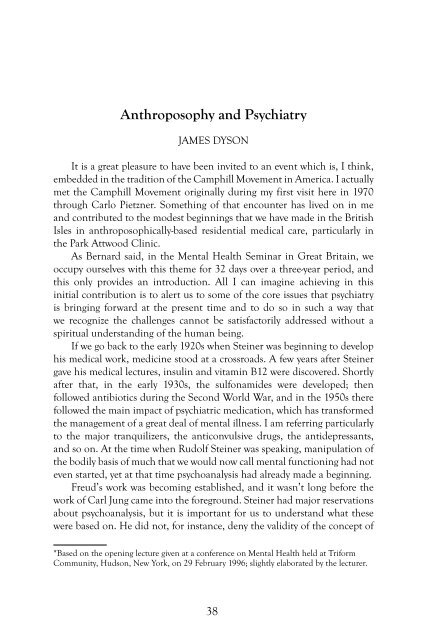When Healing Becomes Educating, Vol. 1 - Waldorf Research Institute
When Healing Becomes Educating, Vol. 1 - Waldorf Research Institute
When Healing Becomes Educating, Vol. 1 - Waldorf Research Institute
Create successful ePaper yourself
Turn your PDF publications into a flip-book with our unique Google optimized e-Paper software.
Anthroposophy and Psychiatry<br />
JAMES DYSON<br />
It is a great pleasure to have been invited to an event which is, I think,<br />
embed ded in the tradition of the Camphill Movement in America. I actually<br />
met the Camphill Movement originally during my first visit here in 1970<br />
through Carlo Pietzner. Something of that encounter has lived on in me<br />
and contributed to the modest beginnings that we have made in the British<br />
Isles in anthroposophically-based residential medical care, particularly in<br />
the Park Attwood Clinic.<br />
As Bernard said, in the Mental Health Seminar in Great Britain, we<br />
occupy ourselves with this theme for 32 days over a three-year period, and<br />
this only provides an introduction. All I can imagine achieving in this<br />
initial contribution is to alert us to some of the core issues that psychiatry<br />
is bringing forward at the present time and to do so in such a way that<br />
we recognize the challenges cannot be satisfactorily addressed without a<br />
spiritual under standing of the human being.<br />
If we go back to the early 1920s when Steiner was beginning to develop<br />
his medical work, medicine stood at a crossroads. A few years after Steiner<br />
gave his medical lectures, insulin and vitamin B12 were discovered. Shortly<br />
after that, in the early 1930s, the sulfonamides were developed; then<br />
followed antibiotics during the Second World War, and in the 1950s there<br />
followed the main impact of psychiatric medication, which has transformed<br />
the management of a great deal of mental illness. I am referring particularly<br />
to the major tranquilizers, the anticonvulsive drugs, the antidepressants,<br />
and so on. At the time when Rudolf Steiner was speaking, manipulation of<br />
the bodily basis of much that we would now call mental functioning had not<br />
even started, yet at that time psychoanalysis had already made a beginning.<br />
Freud’s work was becoming established, and it wasn’t long before the<br />
work of Carl Jung came into the foreground. Steiner had major reservations<br />
about psychoanalysis, but it is important for us to understand what these<br />
were based on. He did not, for instance, deny the validity of the concept of<br />
*Based on the opening lecture given at a conference on Mental Health held at Triform<br />
Community, Hudson, New York, on 29 February 1996; slightly elaborated by the lecturer.<br />
38

















